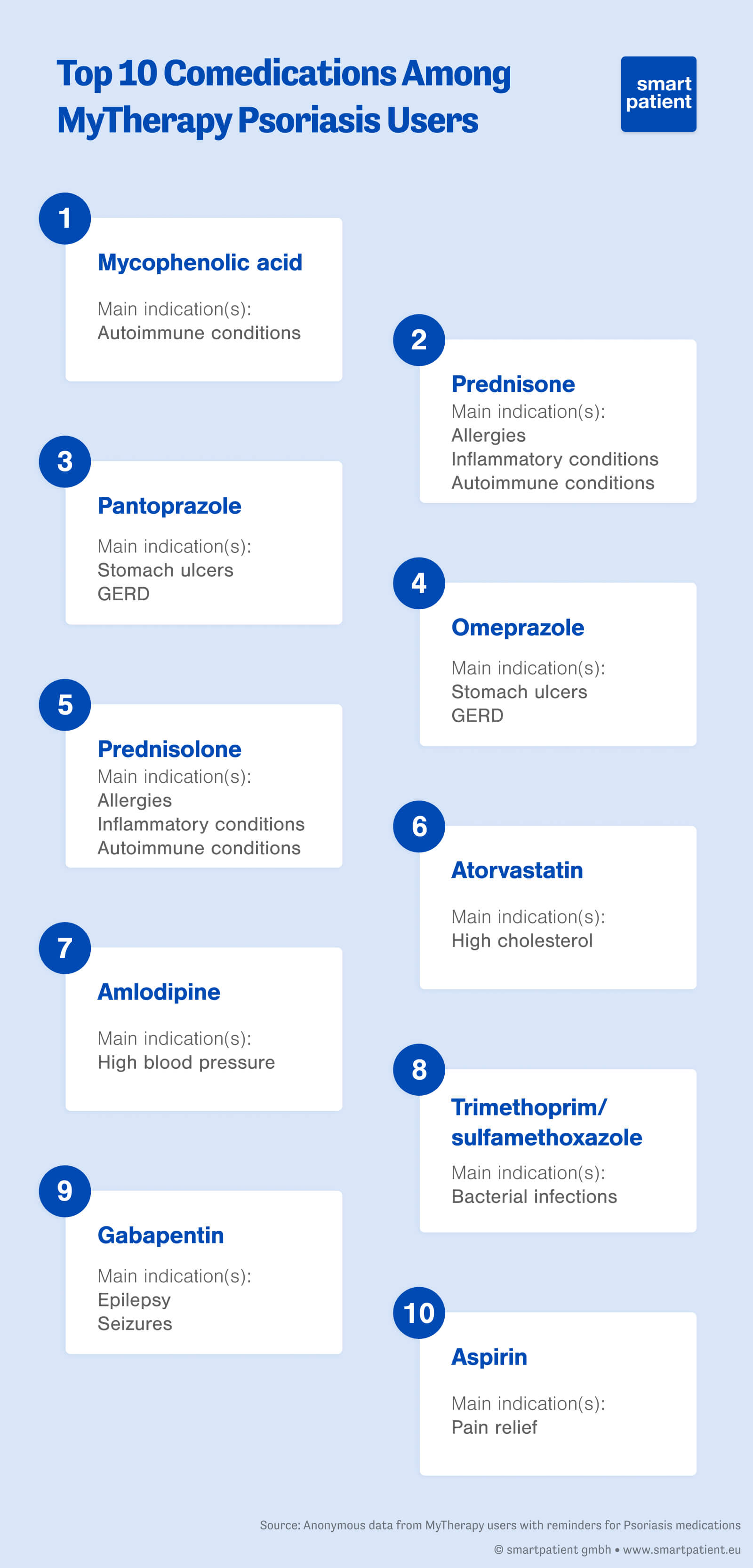Why Pharma’s Digital Patient Support for Psoriasis Often Fails to Engage Users
Data from thousands of MyTherapy users taking psoriasis medications highlights why taking a disease- or drug-centric approach to patient support is flawed. Meeting users’ broader treatment needs is essential for pharma’s programs to achieve greater acceptance and engagement

- Thousands of MyTherapy users take psoriasis medications. On average, these users have 6.7 reminders scheduled for medications, supplements, activities, and health tracking, pointing to a big need for also managing comorbidities
- The most common reminders for psoriasis users include immunosuppressants and tracking blood pressure. These users’ support needs go far beyond pharma’s typically product- or at best disease-centric patient support offerings
- For pharma’s patient support in psoriasis to gain traction, it needs to become meaningful. Psoriasis PSPs need to put patients at the center, not a single product or disease. Using platforms already embraced by multimorbid users may be a promising strategic response
Over 3,500 MyTherapy users have reminders scheduled for psoriasis medications. On average, these users have 6.7 reminders scheduled in the app (for context, users taking MS meds have an average of 3.9 reminders). The reminders users have scheduled include other medications, supplements, vitamins, activity reminders, and tracking measurements such as blood pressure and weight. Many users’ health management requirements clearly expand beyond a single drug or disease, highlighting a flaw in the approach pharma has typically taken to digital patient support programs.
Psoriasis Patient Research: What Real-World Data Tells Us
Drugs used to treat psoriasis are often also used to treat other serious chronic conditions. Adalimumab (Humira), for example, is also used to treat conditions such as Crohn’s disease and ankylosing spondylitis. So, while not every MyTherapy user who has reminders scheduled for these drugs will have been diagnosed with psoriasis, the fundamental point holds true: that users taking these drugs have complex and diverse needs when it comes to patient support, extending beyond a single drug or disease.
In fact, among the 3,700 MyTherapy users taking psoriasis medications, a total of nearly 6,000 different additional reminders are scheduled.
Over 20 of these are scheduled by 100 or more users, including atorvastatin, folate, blood pressure tracking, and symptom checks.

What the data makes abundantly clear is that psoriasis – or any single chronic condition – accounts for only a part of most users’ healthcare needs. Cardiovascular diseases, metabolic diseases, inflammatory bowel disease, gastro-oesophageal reflux disease, and mental health conditions – all of which are comorbidities associated with psoriasis – are prevalent among a significant number of users analyzed.
Pharma, therefore, needs to stop designing digital patient support programs for “psoriasis patients” and, rather, start designing them for “users” for whom psoriasis is only one piece of the puzzle.
Why Pharma’s Psoriasis PSPs Often Fail to Engage Users
For many of the drugs considered when analyzing this data, digital tools, such as app- and web-based offerings, are an expected part of a modern patient support program. This is especially true of more potent drugs, such as biologics that are used to treat psoriasis (such as Humira, Cimzia, and Cosentyx).
Often, though, we see pharma’s psoriasis patient support programs (PSPs) designed to fit pharma’s disease silos. While this makes sense to pharma, it does not make sense to users, most of whom do not fit neatly into these silos. As a result, users see little benefit in a patient support program designed for “psoriasis patients,” when they do not categorize themselves primarily as such and when their needs do not revolve solely around psoriasis. Furthermore, for those taking medications for comorbidities or requiring other tools to manage their health and wellbeing, such a narrow offering fails to offer meaningful support in their day-to-day lives.
It is hardly surprising, therefore, that pharma has found the psoriasis patient engagement nut a tough one to crack.
However, there are significant benefits to be had by pharma achieving greater levels of engagement, both for patients and for pharma. As discussed in a previous blog, many people living with psoriasis could benefit from different treatment options, greater awareness of which can be achieved with reliable patient education. Targeted and relevant patient education and support can also help achieve greater levels of medication adherence and persistence, the benefits of which are clear. How can pharma provide support services that meet users’ wider healthcare needs, generate engagement, and deliver such benefits?
Bridging The Relevance Gap in Pharma’s Psoriasis PSPs
The gap between patient needs and pharma's patient support offerings is not an issue unique to psoriasis. It exists in relation to any number of chronic diseases. At the same time, as with other diseases, we see thousands of psoriasis users adopt MyTherapy as their disease management platform. However, originally conceived as an app for anyone taking medications, there used to be a limit to how much disease- or even drug-specific support we can offer within MyTherapy.
This is what has led us to launch ‘MyTherapy for Psoriasis’, our second disease-specific extension to our platform, following ‘MyTherapy for MS’. Users accessing these extensions will continue to benefit from MyTherapy’s top-rated core features, while also gaining access to disease-specific content and functionalities. In essence, they get the best from two worlds: Comprehensive support for managing their entire treatment AND specific support for their disease
As was the case with ‘MyTherapy for MS’, ‘MyTherapy for Psoriasis’ has been met with an enthusiastic response with our partners in pharma. To be able to provide tailored disease- and even drug-specific support to patients on a platform they already use to manage their wider treatment is a simple yet powerful concept. Tapping into this engaged userbase is an effective way for pharma to deliver reliable patient education. Also, the layered approach allows pharma to additionally provide tailored functionality for safety and adherence support for patients prescribed their particular medication, without needing to start from scratch. We believe this model can provide the digital patient support users can truly benefit from, for MS, psoriasis, and many more chronic conditions. If you want to learn more about partnership opportunities, don’t hesitate to get in touch.



